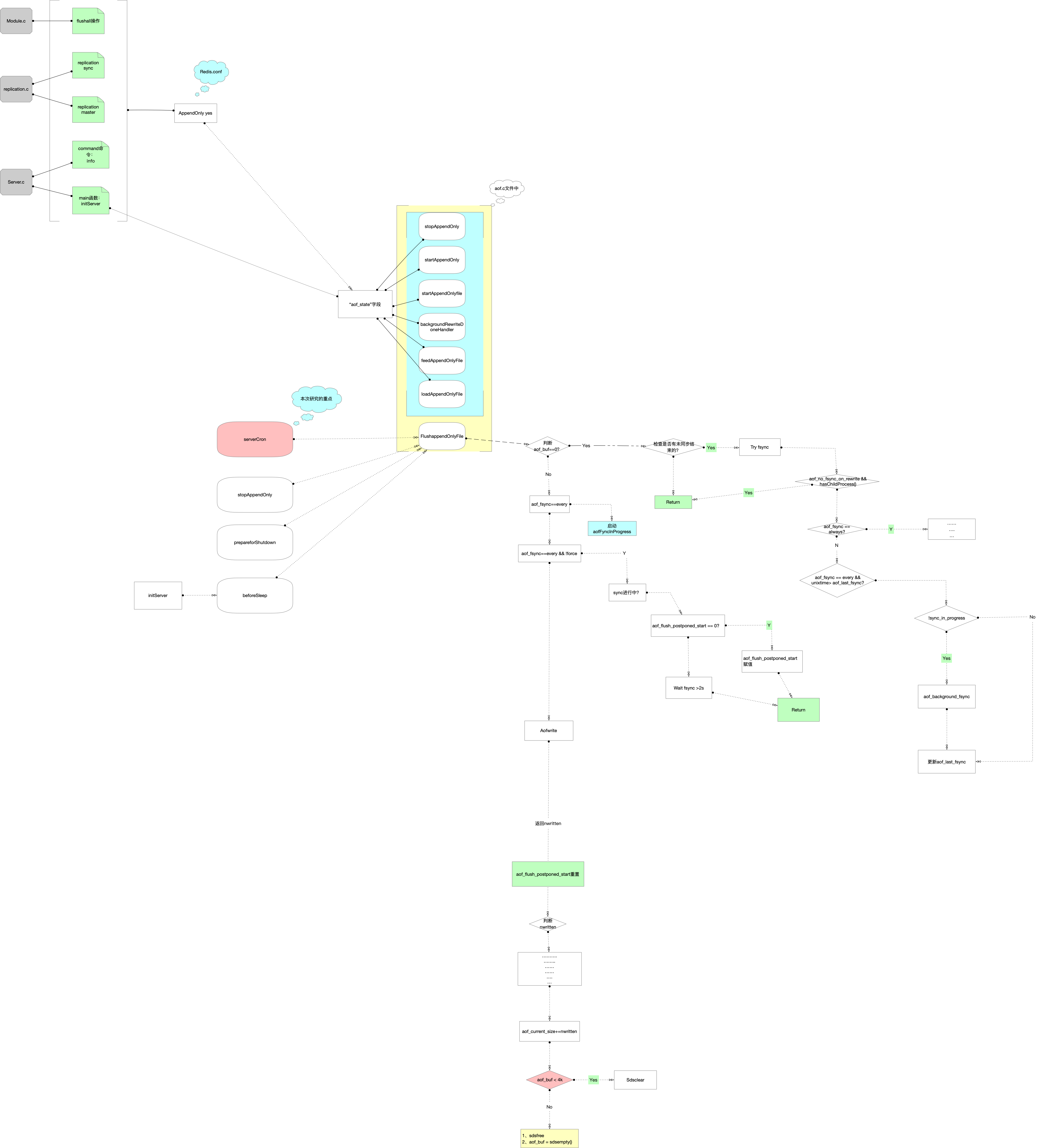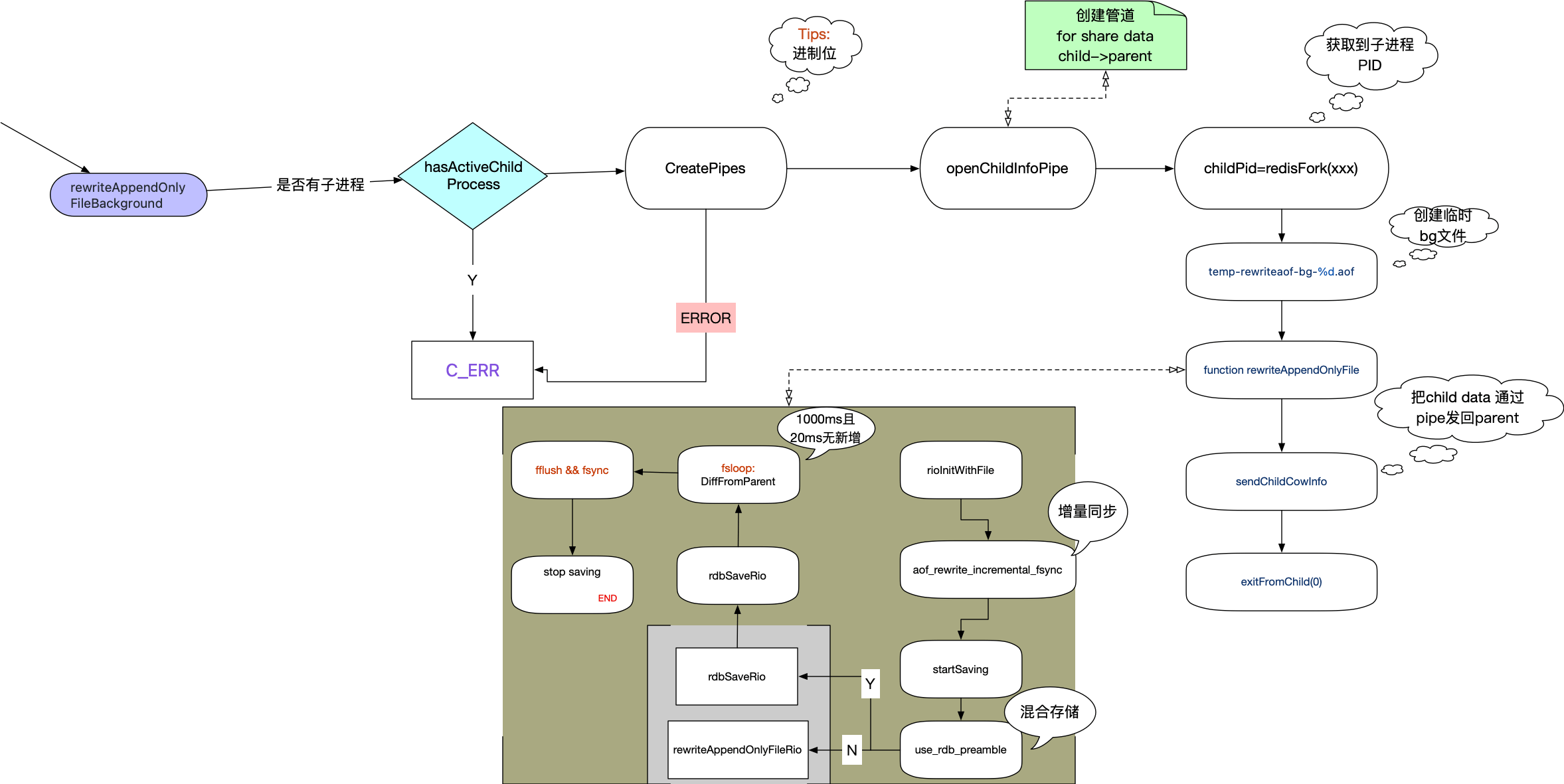1
2
3
4
5
6
7
8
9
10
11
12
13
14
15
16
17
18
19
20
21
22
23
24
25
26
27
28
29
30
31
32
33
34
35
36
37
38
39
40
41
42
43
44
45
46
47
48
49
50
51
52
53
54
55
56
57
58
59
60
61
62
63
64
65
66
67
68
69
70
71
72
73
74
75
76
77
78
79
80
81
82
83
84
85
86
87
88
89
90
91
92
93
94
95
96
97
98
99
100
101
102
103
104
105
106
107
108
109
110
111
112
113
114
115
116
117
118
119
120
121
122
123
124
125
126
127
128
129
130
131
132
133
134
135
136
137
138
139
140
141
142
143
144
145
146
147
148
149
150
151
152
153
154
155
156
157
158
159
160
161
162
163
164
165
166
167
168
169
170
171
172
173
174
175
176
177
178
179
180
181
182
183
184
185
186
187
188
189
190
191
192
193
194
195
196
197
198
199
200
201
202
203
204
205
206
207
208
209
210
211
212
213
214
215
216
217
218
219
220
221
222
223
224
225
226
227
228
|
int loadAppendOnlyFile(char *filename) {
struct client *fakeClient;
FILE *fp = fopen(filename,"r");
struct redis_stat sb;
int old_aof_state = server.aof_state;
long loops = 0;
off_t valid_up_to = 0;
off_t valid_before_multi = 0;
if (fp == NULL) {
serverLog(LL_WARNING,"Fatal error: can't open the append log file for reading: %s",strerror(errno));
exit(1);
}
if (fp && redis_fstat(fileno(fp),&sb) != -1 && sb.st_size == 0) {
server.aof_current_size = 0;
server.aof_fsync_offset = server.aof_current_size;
fclose(fp);
return C_ERR;
}
server.aof_state = AOF_OFF;
fakeClient = createAOFClient();
startLoadingFile(fp, filename, RDBFLAGS_AOF_PREAMBLE);
char sig[5];
if (fread(sig,1,5,fp) != 5 || memcmp(sig,"REDIS",5) != 0) {
if (fseek(fp,0,SEEK_SET) == -1) goto readerr;
} else {
rio rdb;
serverLog(LL_NOTICE,"Reading RDB preamble from AOF file...");
if (fseek(fp,0,SEEK_SET) == -1) goto readerr;
rioInitWithFile(&rdb,fp);
if (rdbLoadRio(&rdb,RDBFLAGS_AOF_PREAMBLE,NULL) != C_OK) {
serverLog(LL_WARNING,"Error reading the RDB preamble of the AOF file, AOF loading aborted");
goto readerr;
} else {
serverLog(LL_NOTICE,"Reading the remaining AOF tail...");
}
}
while(1) {
int argc, j;
unsigned long len;
robj **argv;
char buf[128];
sds argsds;
struct redisCommand *cmd;
if (!(loops++ % 1000)) {
loadingProgress(ftello(fp));
processEventsWhileBlocked();
processModuleLoadingProgressEvent(1);
}
if (fgets(buf,sizeof(buf),fp) == NULL) {
if (feof(fp))
break;
else
goto readerr;
}
if (buf[0] != '*') goto fmterr;
if (buf[1] == '\0') goto readerr;
argc = atoi(buf+1);
if (argc < 1) goto fmterr;
argv = zmalloc(sizeof(robj*)*argc);
fakeClient->argc = argc;
fakeClient->argv = argv;
for (j = 0; j < argc; j++) {
char *readres = fgets(buf,sizeof(buf),fp);
if (readres == NULL || buf[0] != '$') {
fakeClient->argc = j;
freeFakeClientArgv(fakeClient);
if (readres == NULL)
goto readerr;
else
goto fmterr;
}
len = strtol(buf+1,NULL,10);
argsds = sdsnewlen(SDS_NOINIT,len);
if (len && fread(argsds,len,1,fp) == 0) {
sdsfree(argsds);
fakeClient->argc = j;
freeFakeClientArgv(fakeClient);
goto readerr;
}
argv[j] = createObject(OBJ_STRING,argsds);
if (fread(buf,2,1,fp) == 0) {
fakeClient->argc = j+1;
freeFakeClientArgv(fakeClient);
goto readerr;
}
}
cmd = lookupCommand(argv[0]->ptr);
if (!cmd) {
serverLog(LL_WARNING,
"Unknown command '%s' reading the append only file",
(char*)argv[0]->ptr);
exit(1);
}
if (cmd == server.multiCommand) valid_before_multi = valid_up_to;
fakeClient->cmd = fakeClient->lastcmd = cmd;
if (fakeClient->flags & CLIENT_MULTI &&
fakeClient->cmd->proc != execCommand)
{
queueMultiCommand(fakeClient);
} else {
cmd->proc(fakeClient);
}
serverAssert(fakeClient->bufpos == 0 &&
listLength(fakeClient->reply) == 0);
serverAssert((fakeClient->flags & CLIENT_BLOCKED) == 0);
freeFakeClientArgv(fakeClient);
fakeClient->cmd = NULL;
if (server.aof_load_truncated) valid_up_to = ftello(fp);
if (server.key_load_delay)
debugDelay(server.key_load_delay);
}
if (fakeClient->flags & CLIENT_MULTI) {
serverLog(LL_WARNING,
"Revert incomplete MULTI/EXEC transaction in AOF file");
valid_up_to = valid_before_multi;
goto uxeof;
}
loaded_ok:
fclose(fp);
freeFakeClient(fakeClient);
server.aof_state = old_aof_state;
stopLoading(1);
aofUpdateCurrentSize();
server.aof_rewrite_base_size = server.aof_current_size;
server.aof_fsync_offset = server.aof_current_size;
return C_OK;
readerr:
if (!feof(fp)) {
if (fakeClient) freeFakeClient(fakeClient);
fclose(fp);
serverLog(LL_WARNING,"Unrecoverable error reading the append only file: %s", strerror(errno));
exit(1);
}
uxeof:
if (server.aof_load_truncated) {
serverLog(LL_WARNING,"!!! Warning: short read while loading the AOF file !!!");
serverLog(LL_WARNING,"!!! Truncating the AOF at offset %llu !!!",
(unsigned long long) valid_up_to);
if (valid_up_to == -1 || truncate(filename,valid_up_to) == -1) {
if (valid_up_to == -1) {
serverLog(LL_WARNING,"Last valid command offset is invalid");
} else {
serverLog(LL_WARNING,"Error truncating the AOF file: %s",
strerror(errno));
}
} else {
if (server.aof_fd != -1 && lseek(server.aof_fd,0,SEEK_END) == -1) {
serverLog(LL_WARNING,"Can't seek the end of the AOF file: %s",
strerror(errno));
} else {
serverLog(LL_WARNING,
"AOF loaded anyway because aof-load-truncated is enabled");
goto loaded_ok;
}
}
}
if (fakeClient) freeFakeClient(fakeClient);
fclose(fp);
serverLog(LL_WARNING,"Unexpected end of file reading the append only file. You can: 1) Make a backup of your AOF file, then use ./redis-check-aof --fix <filename>. 2) Alternatively you can set the 'aof-load-truncated' configuration option to yes and restart the server.");
exit(1);
fmterr:
if (fakeClient) freeFakeClient(fakeClient);
fclose(fp);
serverLog(LL_WARNING,"Bad file format reading the append only file: make a backup of your AOF file, then use ./redis-check-aof --fix <filename>");
exit(1);
}
|







